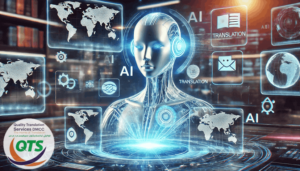What are the Biggest Challenges Facing AI Translation Technology?
Introduction
No one can deny that AI is cool! It can drive cars, write poetry, and even diagnose diseases. The craze of artificial intelligence has even swept across industries, promising efficiency and cost-savings. Translation and Localization are no exceptions. But can it handle the complexity of human language? Over social media, many business owners have complained about experiencing issues with machine translation quality, impacting brand reputation and customer satisfaction.
Chat GPT translation might seem like a quick fix. But is it really the smartest choice? In this article, we’ll explore some of the challenges businesses face when using AI translation technology.
Challenge 1: Grasping Cultural Nuances
Languages aren’t just words; they are living and breathing through us! New words, slang, and cultural references pop up all the time. AI, unfortunately, is a bit of a slow learner. By the time it catches up with the latest trends, the language might have already changed again. Additionally, AI models are trained on vast amounts of text data, but this data might not always be representative of contemporary language usage. This can result in outdated or irrelevant translations.
Challenge 2: Lack of Common Sense
Humans have a unique ability to understand the world around us and apply common sense to problem-solving. AI, on the other hand, lacks this ability. This limitation becomes quite apparent in translation, where understanding the underlying meaning and context is crucial. For example, an AI might translate “The spirit is willing but the flesh is weak” literally, missing the intended meaning entirely.
A popular brand turns to AI to translate “Have a nice day!” into Spanish which turns out to be ‘’Enjoy your dead!’’. This was the result of AI mistaking the word ‘’nice’’ for the Spanish word “nice”, which means ‘’dead’’. Their campaign hit a dead-end when people started to post about it.
There’s no AI for common sense!
Challenge 3: Dealing with Jargon
Every field has its own secret language. Legal, medical, and technology professionals all have their specialized terms. AI might be able to translate the words, but understanding the context and the correct equivalent is a whole different ball game.
A mistranslated medical term could be a matter of life and death. It’s not something you want to risk with a robot translator. Moreover, AI often struggles with polysemy, where a word can have multiple meanings depending on the context. This can lead to significant errors in specialized fields.
Challenge 4: Privacy Concerns
Imagine pouring your heart out in a document, only to have it fed to a machine that might share your secrets with the world. Data privacy is a major concern with AI translation. AI models require large amounts of training data, which can include sensitive information. There’s a risk of data breaches and unauthorized access, putting confidential information at risk.
Challenge 5: Scale and Integration
Humans possess a unique ability to understand the world around them and apply common sense to problem-solving. AI, on the other hand, lacks this ability. This limitation becomes apparent in translation, where understanding the underlying meaning and context is crucial. For example, an AI might translate “The spirit is willing but the flesh is weak” literally, missing the intended meaning entirely.
Businesses need legal translation services that can grow with them. AI might be great for small-scale projects, but when it comes to handling massive volumes of content, it can start to show its limitations. Plus, integrating AI translation into existing workflows can be a real headache.
Challenge 6: Cost and Resource Intensive
Developing and maintaining high-quality AI translation models is expensive and requires significant computational resources. Smaller businesses and organizations may find it difficult to invest in such technology. Additionally, training AI models on specialized domains can be time-consuming and costly, further limiting their accessibility.
What’s the Alternative?
While AI translation is undoubtedly impressive, it’s clear that we’re not quite there yet. Human translators still hold the upper hand when it comes to delivering accurate, culturally sensitive, and high-quality translations. We believe that great translations are a blend of technology and human ingenuity. Our team of professional translators in Dubai, skilled linguists, and subject matter experts bring a deep understanding of language, culture, and industry to every project.
We offer:
- Cultural Sensitivity
Our translators are native speakers who truly get the culture. We’ll make sure your message lands perfectly, every time.
- Industry Expertise
Whether you’re in law, medicine, or tech, we have experts who speak your language.
- Data Security
Your information is safe with us. We use state-of-the-art security measures to protect your sensitive data.
- Scalability
Big project? Small project? No problem. We can handle any volume, from a single document to a global marketing campaign.
- Integration
Our translation process won’t hamper your process. It fits seamlessly into your workflow, saving you time and hassle.
Let’s work together to break down language barriers, the right way. Contact us today to know more about our Legal Translation Services in Dubai.


